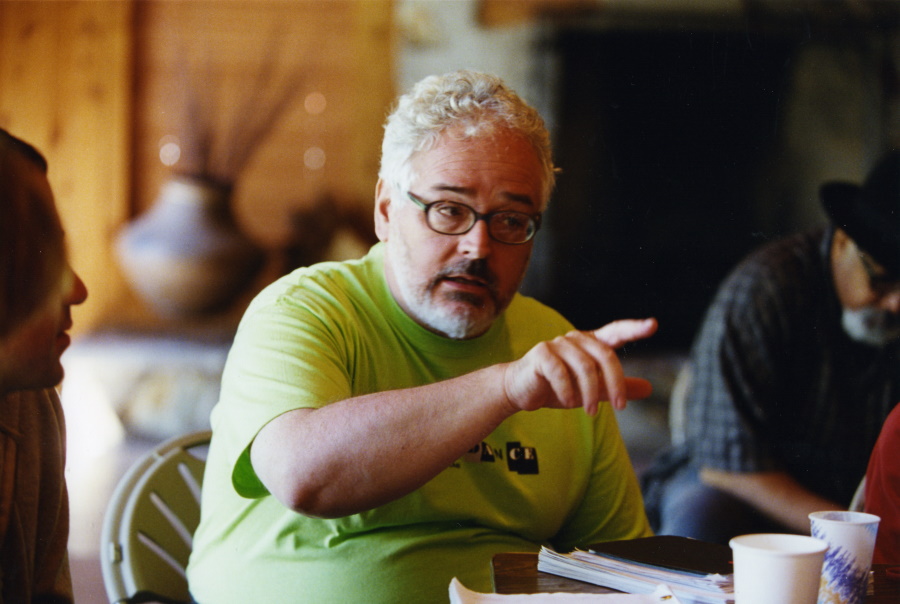I was one of the many fortunate theatre folks to prosper from Robert Blacker’s unparalleled insights about what we call storytelling—as well as his wonderfully wry and piercing sense of humor. When I was invited to lead the Sundance Institute Theatre Program as its producing artistic director in 1996, I made two decisions early on. The first was to rechristen the Playwrights Lab as the Sundance Theatre Lab, more purposefully reflecting the landscape of how new theatrical work was being conceived, not solely by authors but also by generative directors and ensembles. The next—and best—decision I made was to hire Bob Blacker as the lab’s artistic director, a role he filled from 1997 through 2004.
Bob had recently completed his acclaimed tenure at the newly revived La Jolla Playhouse as its associate artistic director under Des McAnuff, and there was no one better suited to lead a robust, reimagined conversation about how best to support the vision of American theatremakers. He was and will always be one of our country’s quintessential dramaturgs, exemplary in his ability to talk to writers and directors, to get to the beating heart of the “why” of their creation, and to encourage their most audacious rewrites.
Doug Wright was one of those writers, and he recalls, “Robert dispensed dramaturgical advice about your plays the way a favorite uncle dispenses wisdom about your family; he loves them, of course, but he also knows the buried secrets, the old animosities, the eccentricities, and the baroque history that make his perspective especially informed, especially valuable. And you always know your own secrets are safe with him.” He could also be the prod a writer needed. As Wright puts it, “I’ll never forget the summer Robert invited me to Sundance to write I Am My Own Wife. He knew I’d been procrastinating for years. ‘I can’t write the play,’ I whined. ‘The subject is beyond me! I’ve no knowledge of German, of World War II history, of life inside a police state, or transgender theory. I’d do it, but I don’t have the expertise.’ Robert looked at me with his elfin smile and said, ‘You’re right. You know nothing about those things. But you do know what it means to fall fiercely in love with a compelling, unforgettable character. Write about that instead.’ After that, the play poured out of me with astonishing ease.”
It wasn’t just that Pulitzer-winning play. Says Wright, “Like so many of my fellow theatre artists, I feel like Robert was the midwife to my career; with an unceasing ability to nurture, a keen eye on the bigger picture, and a heightened sensitivity to nuance, he helped to birth every single one of my plays.”
In many ways, Robert (known to most of us as “Blacker”) defined a powerful new idea of dramaturgy for the American theatre. His love of language was unparalleled. He luxuriated in words and ideas. Indeed, he fathomed great writing because he was, first and foremost, lovingly steeped in the classics—not only plays but poetry, novels, opera, all narratives—and possessed the uncanny gift of seeing every new play from multifaceted perspectives. To Blacker, each and every burgeoning new voice could well be a dramatist for the ages.
His feedback sessions after final readings at the Theatre Lab were legendary. His ability to organize a conversation and helpfully guide a writer toward posing the smartest and fiercest questions about their work became a trademark of Sundance’s collaborative vision. Granted, more than a few of those conversations seemed to last as long as the play we had just witnessed—some even had intermissions!—but his astute ability to guide and challenge and illuminate the discourse absolutely impacted a body of new work and helped create some of the most enduring new plays.
There were dozens of other Sundance artists who in some measure owe their subsequent success to Mr. Blacker. Among them: Emily Mann, Jessica Hagedorn, Sybille Pearson, Nilo Cruz, Regina Taylor, Ruth Maleczech, Michael Feingold, Terry O’Reilly, Moisés Kaufman, Dael Orlandersmith, Paula Vogel, Naomi Iizuka, Steven Sater, Duncan Sheik, Carl Hancock Rux, Julia Cho, Chuck Mee, José Rivera, Craig Lucas, John Kelly, Lisa Kron, Marty Moran, Lynn Nottage, Lee Breuer, Philip Kan Gotanda, David Grimm, Stew—to name a few.
Like all important voices, his was occasionally controversial, and like all big personalities he sometimes prickled his cohorts. But his perceptions always came from deep within his heart as well as his intellect. Mostly he taught us. He brought the reputation of the Sundance Institute to a new level. Like any of us who were fortunate enough to know and work with Robert—scores of staff dramaturgs, playwrights, directors, as well as the countless students he mentored at Yale and UCSD—we carry his imagination, his aspirations, his good humor, and his insightful art of dramaturgy forward.
Oh, and lest we forget: Robert Blacker wore the most amazing pants!
Philip Himberg is executive director of the MacDowell Colony.


